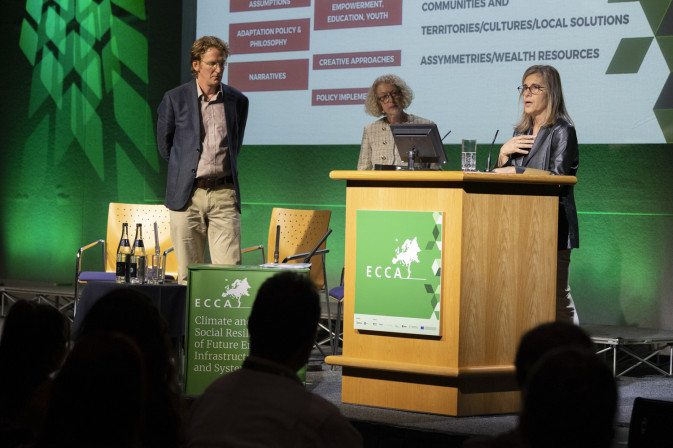Sessions on "Reframing Societal Transformation by Challenging Underlying Assumptions" addressed the underlying assumptions that shape our society and the global system and lead to our destructive behaviour towards our living environment. What needs to be reframed to be able to act differently? Several approaches and perspectives were explored, such as eco-philosophy and ‘transformative realism’. Practical examples indicated that gender equality and a decent livelihood are prerequisites for successful climate action.
Techniques to support creative future visioning to go beyond considering only probable outcomes were presented, such as the use of narratives in creative story-telling workshops and writing poetry. These techniques may help to reach and engage for instance youth and children and empower them to become change makers for a climate-resilient future in their schools and broader social systems.
Technical solutions will not solve our climate adaptation problems; people need to adapt their behaviour. To understand human behaviour and underlying assumptions, it is important to be aware that the pervasive view on the relationship of humans and nature, in which humans are superior and can exploit nature, is at the root of many of the current problems and difficult to change. The sessions ‘Adaptation Policy & Philosophy, Reframing Societal Transformation by Challenging Underlying Assumptions’, chaired by Elisabeth Worliczek (BOKU) introduced radically different perspectives toward the human-environment relationship and adaptation and explained attitudes and practices that may obstruct or support changes. The participants drew from a variety of backgrounds and expertise in societal transition, theology, activism, anthropology and neurosciences.
Chair Maria Fernanda Rollo, (NOVA Lisbon) presented findings from story-telling workshops that explored how creative future visioning can go beyond considering only probable outcomes. In the session ‘Empowerment, Education, Youth’, initiatives for the benefit of young children were presented. One intervention involves modifying school menus, raising awareness and emphasizing the cultural and environmental aspects of food. The other highlighted books to support children living through periods of global social crisis such as climate change and to challenge drought myths and promote adaptive strategies.
Drawing on insights from the Creative Climate Action Programme in Ireland, a UCC research team provided reflections on reframing knowledge across the art-science-engagement nexus and shared insights about how creative tools can help reframe our visions of change, the future and sustainability. In this session, chaired by Maria Fernanda Rollo, (NOVA Lisbon,) participants used poetry to reframe and share complex ideas and feelings about the future, find new insights and meanings, and probe pathways for addressing challenges arising from climate change.
An important question in this theme is how to achieve impact, which was addressed in ‘From Local Projects to Practical Impacts - Strengthening Local Resilience for Pan-European Policy Making’. Participants explored different systems and approaches to climate action and discussed how systemic change can be initiated and what drivers and barriers make this difficult or favourable.
Read more about the ECCA2023 theme “Reframing Societal Transformation by Challenging Underlying Assumptions” summary.
Read more about the ECCA2023 Policy Brief Workshop.
Watch the session about Reframing Societal Transformation by Challenging Underlying Assumptions on our ECCA2023 YouTube channel.
Read more about CCC-CATAPULT project.
Author: Joske Houtkamp

Explore the photo galleries from:
-ECCA2023 Monday 19 June, 2023 here.
-ECCA2023 Tuesday 20 June, 2023 here.
-ECCA2023 Wednesday 21 June, 2023 here.
-ECCA2023 Extra photos (side events, creative arts, presentations, workshops, etc.) here.
